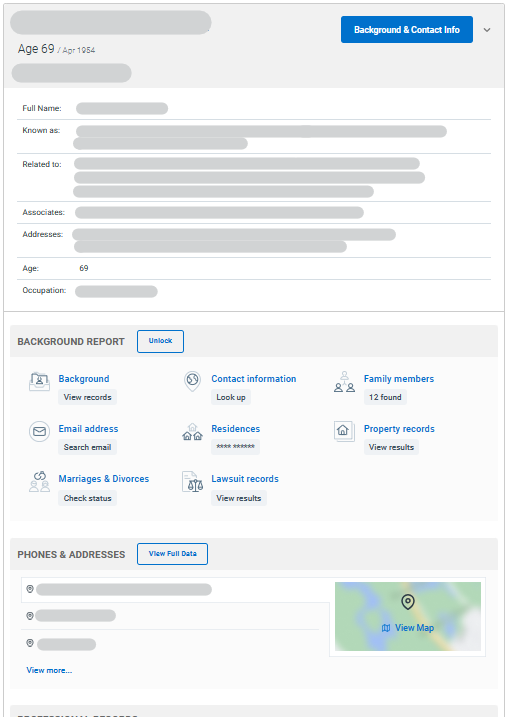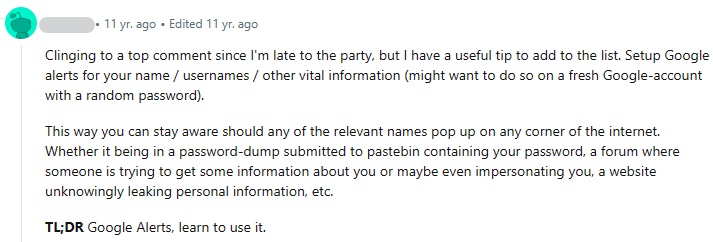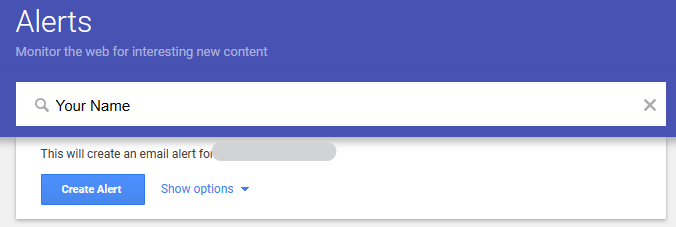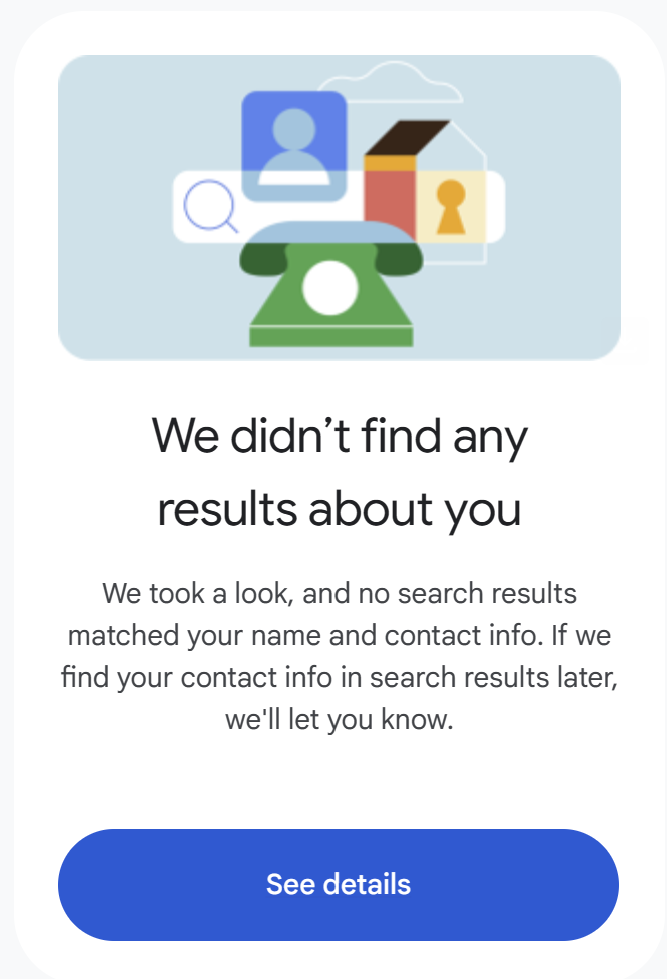How to Prevent Doxxing According to Reddit
- Doxxing
- Is Doxxing Illegal?
- How to Prevent Doxxing According to Reddit
Table of Contents
To save you from googling “how to prevent doxxing reddit” and then going through countless Reddit threads to find relevant answers, we’ve done the hard work for you.
Follow along as we share key points from Redditors on preventing your personal information from being published online without your permission.
How to Prevent Doxxing According to Reddit
Redditors have several good suggestions for keeping yourself safe from the threat of doxxing.
Dox yourself
Since you already have an online footprint, your first step should be to dox yourself, according to one Redditor.

Doxxing yourself involves trying to see how much personal information you can find about yourself online and then deleting as much of this information as possible, whether that’s personal websites, social media comments, forum posts, or something else entirely.
While there are many different ways to approach this, one of the easiest and most common methods is to google yourself.
For step-by-step instructions, follow our guide on how to dox yourself. You can also use our list of self-doxxing tools, of which Google is just one.
Remove yourself from data brokers
As this Redditor suggests, there are websites (called data brokers and people search sites) where you can find a wealth of information about a person just by typing in their username, email address, home address, or full name.

Data brokers deploy automated data scrapers to collect public information from social media pages, public records, and other publicly available sources. They then compile this information into profiles and sell it to anyone with (usually) no questions asked.
A typical data broker profile includes information like a person’s full name, any known aliases, email addresses, phone numbers, past and current home addresses, age, date of birth, family members, places of employment, and links to online accounts (including dating profiles).

You can opt out of data brokers, but you will need to opt out of each one that has a profile on you. Each broker has its own process for opting out; you can browse our list of opt-out guides to see the full selection.
You should also note that data brokers will republish your profile even after you opt out when new information turns up on the internet (meaning you will need to repeat the opt-out process again). Alternatively, consider subscribing to a data broker service such as DeleteMe to have experts handle the repetitive opt-out process for you.
Use unique usernames
One of the most common ways that people get doxxed, according to the below Reddit user, is through the use of the same username for all or most online accounts.

When you use the same (or similar) username for everything, bad actors can follow you across the internet – from social media platforms to forums to online shopping sites. Everywhere you hang out and make posts, they’ll be able to see it (along with any personal information you’ve shared).
Some data brokers also have a reverse username lookup tool, meaning all someone has to do is type in your username to see everything associated with it – including your full name, home address, and so on.
To reduce the risk you’ll be doxxed through your username, use different usernames on each website you have an account with.
Another Redditor suggests using someone else’s username from another platform to throw doxxers off the trail.

Don’t use the same profile picture
Did you know someone could track you across the web through your profile picture (or any other image you share online)?
As this Redditor explains, people don’t realize how easy it is to do a reverse image search on a photo – and how quickly it can connect accounts.
By doing a reverse lookup on your profile picture on Instagram, a bad actor could potentially find your Facebook account, for example (if you posted the picture in both places).

Because of this, you should avoid posting pictures on more than one platform. For optimal safety, avoid sharing pictures of yourself altogether.
Limit what you share on social media
Even though social profiles can be a great source of personal information for doxxers, it’s not realistic for most people to quit social media altogether, as this Redditor acknowledges.

To prevent bad actors from getting your personal information while still using social media, minimize how much sensitive information you post for a public audience.
Limit personal information like where you picked up a coffee today or your new dog’s name to your friends and followers.
By restricting the amount of information you put online, you’ll make it harder for potential doxxers to dig up data that they could use against you.
Set up Google Alerts for your name
If you’ve been following along with each tip and you’ve doxxed yourself as we suggested earlier, then you already know where your personal information is showing up on the internet.
But, unless you plan to dox yourself continuously (recommended, but not always practical), you’ll need to know when new information about you turns up online.
As this Redditor recommends, a good way to ensure you’re informed when that happens is to set up a Google Alert.

Setting up a Google Alert is simple. Visit the Google Alert page (signing in as needed), then type in your full name.

You can also choose to be alerted if your email address or any other contact info shows up.
Google will then send you updates to your RSS feed or email inbox.

Use different email addresses
Along with using different usernames for each account, you should also consider using unique email addresses for different purposes.

By using one email for social networks and forums, for example, and another for communicating with your friends, you’ll reduce the risk that a bad actor will be able to find all your accounts, whether through Google Search or data brokers (in addition to username lookups, data brokers also let you search for people based on their email address).
If a bad actor breaks into one of your accounts, having separate usernames can also prevent them from accessing your other accounts.
Maintaining a separate email for banking and e-commerce will help keep your financial details sequestered.
Another option is using a masked email. This will mask your actual email address with a dummy one, but all emails will be forwarded to your actual email inbox). You can choose between using an email provider with built-in masked email features or a dedicated service. For instance, in addition to data broker removals, all DeleteMe customers also get masked emails.
Remove metadata from photos
Sometimes, the pictures you upload reveal more than you intend – including giving away your location, as this Redditor points out.

Aside from avoiding any store signs or street names when you take your picture (or blurring them out before you upload them), you should be aware that each photo you upload can contain geotags that could pinpoint your location exactly, depending on where you’re uploading it (most social media platforms strip your images of geotags automatically).
Assume whatever is online will stay online
As this Redditor cautions, you should keep in mind that anything you put on the internet could stay there forever.

Deleting a social media or forum post does not mean it is permanently erased.
It’s easy to take screenshots on any device, meaning someone could have taken a picture of what you posted.
Internet archive services also store some websites indefinitely (although, in some cases, you can request them to remove your personal website backup).
Be nice
Well, you don’t have to, but this Redditor makes a good point: Don’t give people a reason to find you, and you’re much less likely to be doxxed.

As a good rule of thumb, don’t say things on the internet that you wouldn’t stand behind in real life.
Being a controversial antagonist or a “troll” online makes it more likely that others will target you and try to “grief” you in real life.
Becoming Undoxxable
Ultimately, the less information there is about you online, the more difficult it will be for someone to dox you. With that in mind, your goal should be to get as close to being undoxxable as you can.
To learn more, read our guide on how to prevent doxxing.
DeleteMe is our premium privacy service that removes you from more than 30 data brokers like Whitepages, Spokeo, BeenVerified, plus many more.
Save 10% on DeleteMe when you use the code BLOG10.
Our privacy advisors:
- Continuously find and remove your sensitive data online
- Stop companies from selling your data – all year long
- Have removed 35M+ records of personal data from the web
Save 10% on any individual and family privacy plan with code: BLOG10












